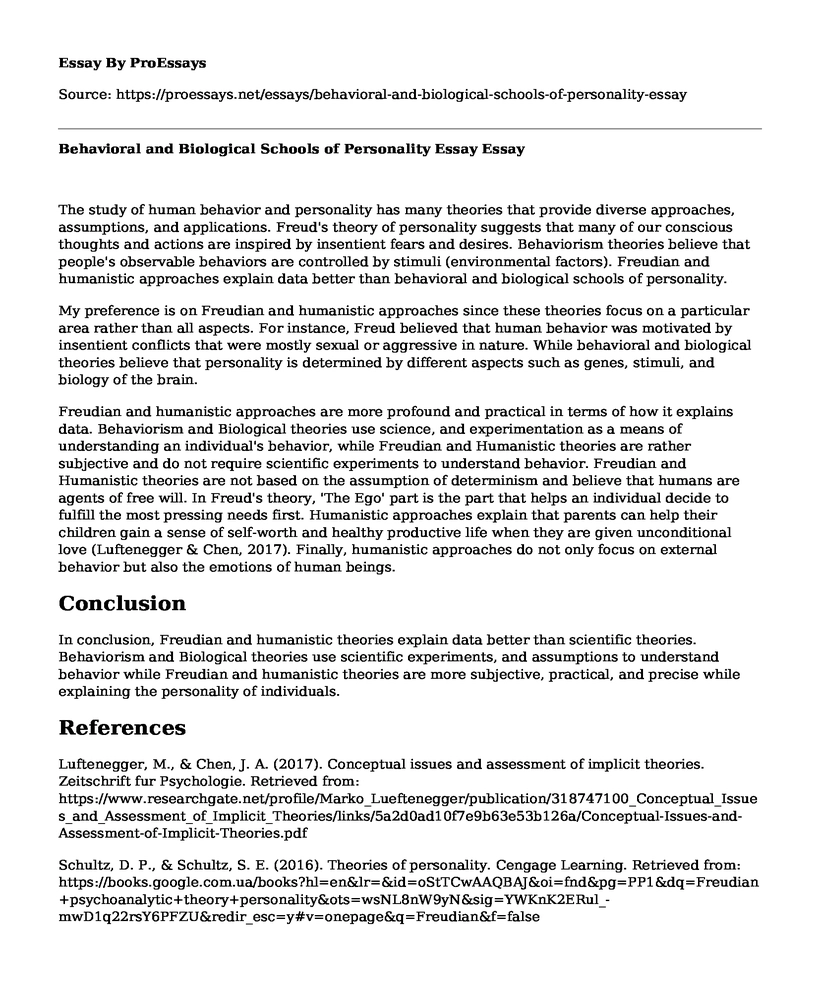The study of human behavior and personality has many theories that provide diverse approaches, assumptions, and applications. Freud's theory of personality suggests that many of our conscious thoughts and actions are inspired by insentient fears and desires. Behaviorism theories believe that people's observable behaviors are controlled by stimuli (environmental factors). Freudian and humanistic approaches explain data better than behavioral and biological schools of personality.
My preference is on Freudian and humanistic approaches since these theories focus on a particular area rather than all aspects. For instance, Freud believed that human behavior was motivated by insentient conflicts that were mostly sexual or aggressive in nature. While behavioral and biological theories believe that personality is determined by different aspects such as genes, stimuli, and biology of the brain.
Freudian and humanistic approaches are more profound and practical in terms of how it explains data. Behaviorism and Biological theories use science, and experimentation as a means of understanding an individual's behavior, while Freudian and Humanistic theories are rather subjective and do not require scientific experiments to understand behavior. Freudian and Humanistic theories are not based on the assumption of determinism and believe that humans are agents of free will. In Freud's theory, 'The Ego' part is the part that helps an individual decide to fulfill the most pressing needs first. Humanistic approaches explain that parents can help their children gain a sense of self-worth and healthy productive life when they are given unconditional love (Luftenegger & Chen, 2017). Finally, humanistic approaches do not only focus on external behavior but also the emotions of human beings.Conclusion
In conclusion, Freudian and humanistic theories explain data better than scientific theories. Behaviorism and Biological theories use scientific experiments, and assumptions to understand behavior while Freudian and humanistic theories are more subjective, practical, and precise while explaining the personality of individuals.
References
Luftenegger, M., & Chen, J. A. (2017). Conceptual issues and assessment of implicit theories. Zeitschrift fur Psychologie. Retrieved from: https://www.researchgate.net/profile/Marko_Lueftenegger/publication/318747100_Conceptual_Issues_and_Assessment_of_Implicit_Theories/links/5a2d0ad10f7e9b63e53b126a/Conceptual-Issues-and-Assessment-of-Implicit-Theories.pdf
Schultz, D. P., & Schultz, S. E. (2016). Theories of personality. Cengage Learning. Retrieved from: https://books.google.com.ua/books?hl=en&lr=&id=oStTCwAAQBAJ&oi=fnd&pg=PP1&dq=Freudian+psychoanalytic+theory+personality&ots=wsNL8nW9yN&sig=YWKnK2ERul_-mwD1q22rsY6PFZU&redir_esc=y#v=onepage&q=Freudian&f=false
Cite this page
Behavioral and Biological Schools of Personality Essay. (2022, Feb 28). Retrieved from https://proessays.net/essays/behavioral-and-biological-schools-of-personality-essay
If you are the original author of this essay and no longer wish to have it published on the ProEssays website, please click below to request its removal:
- Love in Chekhov's Stories
- Paper Example on Bloomberg' Success
- A Change in Mental Health Policy - Paper Example
- Evidence-Based Medicine in Depression Essay Example
- ABA: Helping Autistic Kids Develop Social Skills - Essay Sample
- Essay Example on Personality: Freud's Three-Component Theory Explained
- Psychotherapy for Trauma: Addressing Childhood Sexual Abuse's Impact - Report Example







